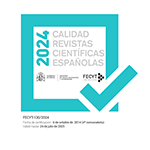Fortuna europea de Lucrecio
Resumen
El autor pasa revista adiferentes aspectos de la obra de Lucrecio, fijándose especialmente en los problemas de su edición por Cicerón, los avatares de los manuscritos, el estilo, su capacidad de observación, el ateísmo adjudicado erróneamente, su fidelidad a Epicuro y el carácter liberador de la doctrina; acomete luego el estudio de su pervivencia en la Antigüedad y en la Modernidad, añadiendo aquí consideraciones científicas que avalan la importancia de Lucrecio en los estudios acerca de la naturaleza.Descargas
Descarga artículo
Licencia
La revista Cuadernos de Filología Clásica. Estudios Latinos, para fomentar el intercambio global del conocimiento, facilita el acceso sin restricciones a sus contenidos desde el momento de su publicación en la presente edición electrónica, y por eso es una revista de acceso abierto. Los originales publicados en esta revista son propiedad de la Universidad Complutense de Madrid y es obligatorio citar su procedencia en cualquier reproducción total o parcial. Todos los contenidos se distribuyen bajo una licencia de uso y distribución Creative Commons Reconocimiento 4.0 (CC BY 4.0). Esta circunstancia ha de hacerse constar expresamente de esta forma cuando sea necesario. Puede consultar la versión informativa y el texto legal de la licencia.








